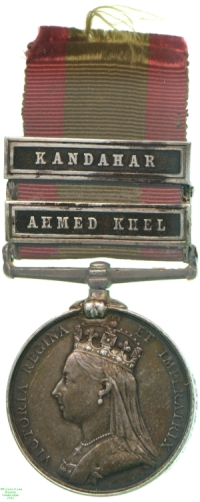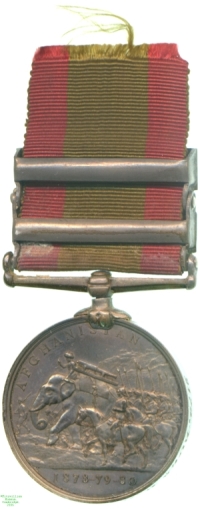
Obverse, a bust of Queen Victoria with veil

Reverse, pack elephant with following troops and mules crossing to the left

Obverse, a bust of Queen Victoria with veil |

Reverse, pack elephant with following troops and mules crossing to the left |
After the initial British success against Amir Sher Ali in Afghanistan in 1878, a British resident was installed in Kabul in 1879, the Amir being sworn (and paid a considerable subsidy) to behave friendlily towards him. This proved no protection against the Resident's murder along with other British residents in September 1879, whereupon war was rejoined. While battle raged around Kabul, the British forces at Kandahar were felt dangerously exposed and orders were given to remove them to join those at Kabul. This journey involved a defeat of Afghan forces at Ahmed Khel.
In July 1880 Sher Ali's nephew Abdur Rahman was proclaimed Amir by the British, whereupon his cousin Ayub Khan, brother of Sher Ali's son Yaqub Khan who had been proclaimed by the Afghans in the previous year, rebelled and defeated a British force sent to oppose him at Maiwand. The remains of this force retired back to Kandahar where they were heavily besieged for a month before relief could arrive from Kabul, in a memorable march that was held to merit a separate medal.
This medal was awarded for participation in both the battle of Ahmed Khel and the final taking of Kandahar, meaning that the recipient, Bugler R. Harris of the 2nd Battalion, 60th Foot, was also eligible for the Kabul to Kandahar Star. It is not impossible that the unnamed example of that piece in the Watson Collection also belonged to Harris. Lester Watson purchased this medal at some point before 1928.